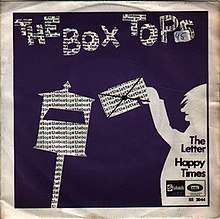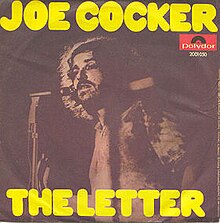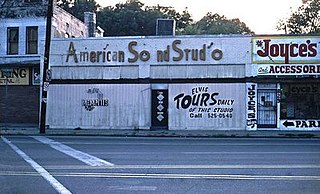
The Box Tops is an American rock band formed in Memphis, Tennessee in 1967. They are best known for the hits "The Letter", "Cry Like a Baby", "Choo Choo Train," and "Soul Deep" and are considered a major blue-eyed soul group of the period. They performed a mixture of current soul music songs by artists such as James & Bobby Purify and Clifford Curry; pop tunes such as "A Whiter Shade of Pale" by Procol Harum; and songs written by their producers, Dan Penn, Spooner Oldham, and Chips Moman. Vocalist Alex Chilton went on to front the power pop band Big Star and to launch a career as a solo artist, during which he occasionally performed songs he had sung with the Box Tops.
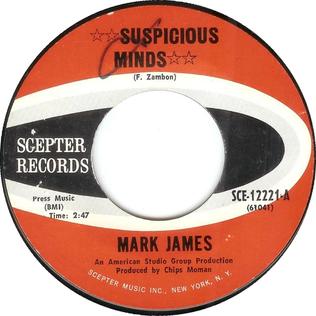
"Suspicious Minds" is a 1968 song written and first recorded by the American songwriter Mark James. After this recording failed commercially, it was recorded by Elvis Presley with the producer Chips Moman. Presley's version reached No.1 on the US Billboard Hot 100.
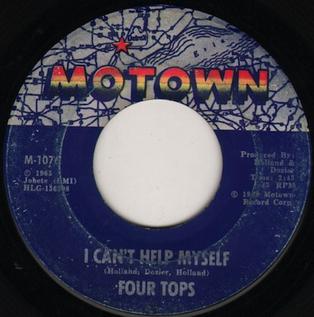
"I Can't Help Myself (Sugar Pie Honey Bunch)" is a 1965 song recorded by the Four Tops for the Motown label.

"Baby I Need Your Loving" is a 1964 hit single recorded by the Four Tops for the Motown label. Written and produced by Motown's main production team Holland–Dozier–Holland, the song was the group's first Motown single and their first pop Top 20 hit, making it to number 11 on the US Billboard Hot 100 and number four in Canada in the fall of 1964. It was also their first million-selling hit single.
"Always on My Mind" is a ballad written by Wayne Carson, Johnny Christopher, and Mark James, first recorded by Brenda Lee and first released by Gwen McCrae in March 1972. Lee's version was released three months later in June 1972. The song has been a crossover hit, charting in both the country and western and pop categories. Elvis Presley's recording was the first commercially successful version of the song.
"(I Know) I'm Losing You" is a 1966 hit single recorded by the Temptations for the Gordy (Motown) label, written by Cornelius Grant, Eddie Holland and Norman Whitfield, and produced by Norman Whitfield.

"Angel of the Morning" is a popular song written by Chip Taylor, originally recorded by Evie Sands but which first charted with a version by Merrilee Rush. The song has been covered by many artists including Chrissie Hynde, Dusty Springfield P. P. Arnold, Connie Eaton, Mary Mason, Guys 'n' Dolls, Melba Montgomery, Olivia Newton-John and most recognizably by Juice Newton.
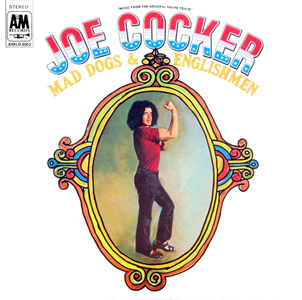
Mad Dogs & Englishmen is a live album by Joe Cocker, released in 1970. The album's title is drawn from the 1931 Noël Coward song of the same name and Leon Russell's "Ballad of Mad Dogs and Englishmen". Only four songs of the 16 on the original album were drawn from his first two studio albums. Besides the contributions of bandmate and musical director Leon Russell, it draws equally from rock and soul. Accompanying Cocker is a choir, a three-piece horn section and several drummers.

"Since I Don't Have You" is a song written and composed by Jackie Taylor, James Beaumont, Janet Vogel, Joseph Rock, Joe Verscharen, Lennie Martin, and Wally Lester. It was first a 1958 hit single for the doo-wop group the Skyliners on the Billboard Hot 100. Country music singer Ronnie Milsap had a hit with the song in 1991. American hard rock band Guns N' Roses also had some success in 1994 with their version of the song which reached the top 10 on the UK Singles Chart.

"To Sir with Love" is the theme from James Clavell's 1967 film To Sir, with Love. The song was performed by British singer and actress Lulu, and written by Don Black and Mark London. Mickie Most produced the record, with Mike Leander arranging and conducting. The song peaked at the top of the Billboard Hot 100, and became the best-selling single of 1967 in the United States.

"It's Only Make Believe" is a song written by drummer Jack Nance and Mississippi-born singer Conway Twitty, while they were touring across Ontario, Canada in 1958. Twitty was a relatively unknown rock n' roll singer at the time, and this song was his first hit, reaching No. 1 on the 'Billboard chart in November 1958 for two weeks.
"If I Were a Carpenter" is a folk song written by Tim Hardin in the 1960s, and re-recorded with commercial success by various artists including Bobby Darin, The Four Tops and Johnny Cash. Hardin's own recording of the piece appeared on his 1967 album Tim Hardin 2. It was one of two songs from that release performed by Hardin at Woodstock in 1969. The song, believed by some to be about male romantic insecurity, is rumored to have been inspired by his love for actress Susan Morss, as well as the construction of Hardin's recording studio.
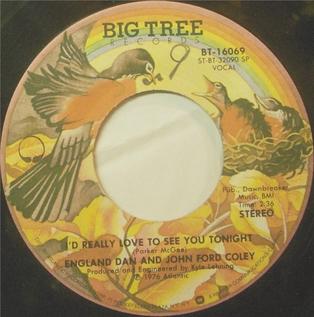
"I'd Really Love to See You Tonight" is a song written by Parker McGee and recorded by England Dan & John Ford Coley from their 1976 album Nights Are Forever. It eventually peaked at No. 2 on the Billboard Hot 100 chart for two weeks, behind Wild Cherry's "Play That Funky Music" and No. 1 on the Easy Listening chart. Billboard ranked it as the No. 21 song for 1976. It also reached No. 26 on the UK Singles Chart.

"Never My Love" is a pop standard written by American siblings Don and Dick Addrisi, and best known from a hit 1967 recording by the Association. The Addrisi Brothers had two Top 40 hits as recording artists, but their biggest success as songwriters was "Never My Love". Recorded by dozens of notable artists in the decades since, in 1999 the music publishing rights organization Broadcast Music, Inc. (BMI) announced it was the second most-played song on radio and television of the 20th century in the U.S.
"Neon Rainbow" is a song written by Wayne Carson Thompson and made famous by Memphis blue-eyed soul band The Box Tops.
"Daddy's Home" is a famous song by American doo-wop group Shep and the Limelites. The song was written by the three members of the band, James "Shep" Sheppard (1935–1970), Clarence Bassett (1936–2005) and Charles Baskerville. The group recorded the original version of "Daddy's Home" on February 1, 1961, and it was released on Hull Records in March 1961 with the B-side being "This I Know".

"Darling Be Home Soon" is a song written by John Sebastian of the Lovin' Spoonful for the soundtrack of the 1966 Francis Ford Coppola film You're a Big Boy Now. It appeared on the Lovin' Spoonful's 1967 soundtrack album You're a Big Boy Now. Sebastian performed his composition at Woodstock; it was the fourth song out of the five he performed at the 1969 music festival in White Lake, New York.

"Cry Like a Baby" is a 1968 song written by Dan Penn and Spooner Oldham, and performed by The Box Tops. The song reached No.2 in April 1968 on the Billboard Hot 100 chart, a position it held for two weeks. It was kept out of the top spot by Bobby Goldsboro's "Honey", which stayed at No.1 for five weeks. "Cry Like a Baby" also reached No.2 on Cashbox for one week. It stayed on the Hot 100 for 15 weeks and Cashbox for 14 weeks. It was awarded a gold disc for selling over one million copies in the United States.

"Soul Deep" is a song originally recorded by Robbie Lane and the Disciples in 1966, but best known by a recorded version by The Box Tops. It was the third of three singles released from their 1969 Dimensions LP. Lead vocals were provided by Alex Chilton.
